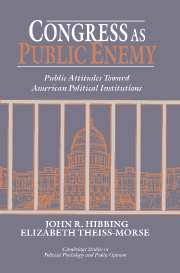Book contents
- Frontmatter
- Contents
- List of figures
- List of tables
- Preface
- CONGRESS AS PUBLIC ENEMY
- 1 Introduction: What is wrong with the American political system?
- 2 Changing levels of support for individual institutions
- 3 Perceptions of political institutions
- 4 Perceptions of congressional features and reforms
- 5 Focus groups and perceptions of the Washington system
- 6 Who approves of Congress?
- 7 Support for democratic processes
- 8 Conclusion: The people and their political system
- Appendix
- References
- Index
7 - Support for democratic processes
Published online by Cambridge University Press: 05 August 2012
- Frontmatter
- Contents
- List of figures
- List of tables
- Preface
- CONGRESS AS PUBLIC ENEMY
- 1 Introduction: What is wrong with the American political system?
- 2 Changing levels of support for individual institutions
- 3 Perceptions of political institutions
- 4 Perceptions of congressional features and reforms
- 5 Focus groups and perceptions of the Washington system
- 6 Who approves of Congress?
- 7 Support for democratic processes
- 8 Conclusion: The people and their political system
- Appendix
- References
- Index
Summary
Democracy in the late twentieth century has such symbolic overtones and generates such strong positive emotions that it is easy to conclude that “Americans love democracy.” Democracy is widely accepted as the best political system. To be called undemocratic is to be condemned. Indeed, “we live in a world that agrees on the importance and desirability of democracy” (Hanson, 1989: 68). Certainly, citizens of the United States are no different in this regard. But what is it that people love? What do people think is so desirable? We have argued thus far that Americans love democracy but hate democratic procedures.
Americans love the constitutional structure and the abstract principles underlying the political system in the United States. They strongly support the three national institutions and the constitutional structure itself. Other research also shows that Americans strongly value abstract democratic principles such as equality, liberty, and political involvement (Almond & Verba, 1963; McClosky & Zaller, 1984). So we can comfortably conclude that a vast majority of Americans love democracy.
But democracy does not begin and end with idealized structures and abstract principles. It also entails practices and processes that translate these structures and principles into real-world politics. Some of these processes must be present in all real-life democracies; others may be visible in only certain kinds of democracies or perhaps in an individual democracy at a particular time. For example, the democratic processes used in America today are not at all the same as those in place two hundred years ago.
- Type
- Chapter
- Information
- Congress as Public EnemyPublic Attitudes toward American Political Institutions, pp. 125 - 144Publisher: Cambridge University PressPrint publication year: 1995

